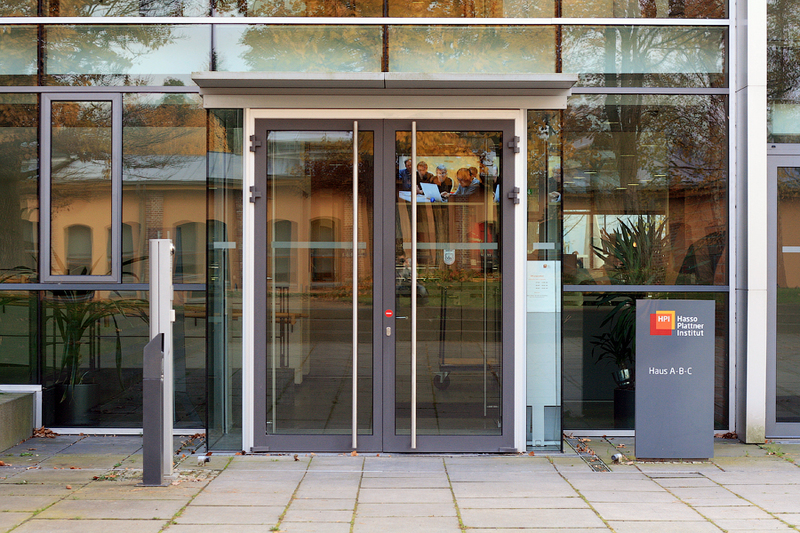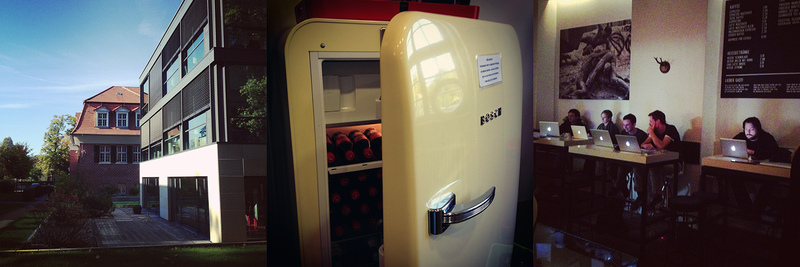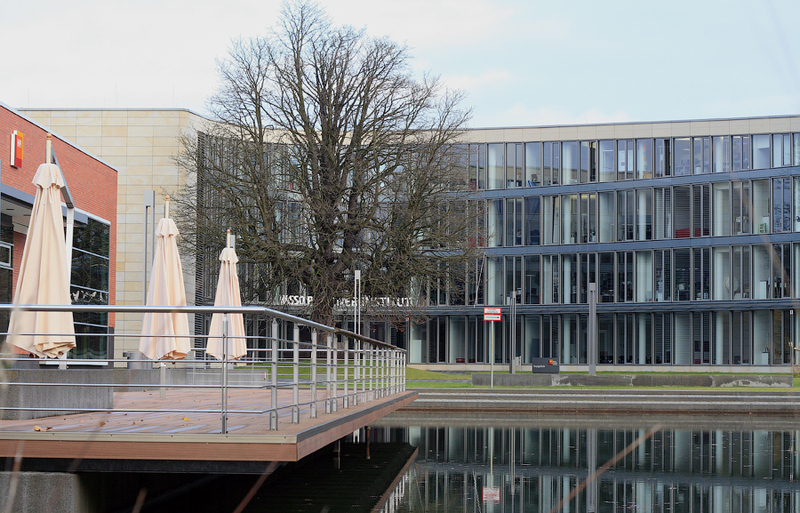Master in Germany: relocation and early days

In the photo: the entrance to one of the buildings HPI
Continuation of the article about admission to the magistracy in Germany . I want to tell you about what you will encounter when moving to Germany, and about your impressions from the beginning of your studies at Hasso Plattner Institut .
Registration and accommodation
When I arrived in Berlin and lived in the hostel for the first two days, I headed to Potsdam's Studentenwerk (a student housing organization) and signed an agreement to rent a room, which I had previously agreed on via e-mail. After payment, the keys were immediately issued, and I went to check in.
In Germany, there is no residence permit, but you still need to provide data on your place of residence to the state. This procedure is short, I designed all the papers in a couple of minutes, taking with me only my passport. Now, having registration, you can open a settlement account in a German bank, get a residence permit. For the latter, however, you must first make an appointment. I was told to come in 30 days with a completed application form and a set of documents. Opening an account in Germany, too, will not work simply by coming to the bank, even if they do not have a single visitor. You will be assigned a Termin, time of visit. The opening of the account itself is no different from a similar procedure in Russia, except that I was invited to the office, treated to coffee and online banking was included in the free account with the card. However, there is another drawback (except that you can not open an account immediately) - debit cards can only be EC (Electronic Cash). Visa and Mastercard are always credit here, and surprisingly few places are accepted, only in clothing stores and expensive grocery stores that need to be looked for.
Enrollment
Entering a university in Germany does not mean being credited. Enrollment for foreign students occurs during a personal visit with the original documents and usually lasts until November. You will also need to have medical insurance and a certain amount of money (usually around € 250) for a student card, which entitles you to free travel in public transport throughout the semester throughout the earth (in my case, including Berlin) and a number of benefits. After completing this quest, all preliminary activities can be considered completed.
')
First days at university
The first two days were completely surveyed, we were taken to different departments and showed what the students were doing. Then I went, without exaggeration, with my mouth open; one pulpit struck more than the other. The best part is that everything they do is related to production, each department has real business partners who are interested in the research and development that is being done. The most vivid impression was made by the Department of Human Computer Interaction, perhaps due to the professor’s charisma, or perhaps simply because of the projects that are being worked on here.

In the photo: a building (from two buildings) with a department closely connected with SAP, a refrigerator with free cola for students and a cafe where it is convenient to do homework after classes
At the beginning of the next week, we were given a schedule of classes, our task was to go to pairs and choose what I wanted to study. For the masters there is not a single compulsory subject, we are completely free in our choice, which at first glance seemed very large - 34 subjects.
All subjects are divided into 3 broad categories: lectures, a seminar and a project. For each subject at HPI, there are either 3 or 6 Credit Points, which should be scored approximately 30 per semester to complete studies in 2 years.
| Lecture | Block or 2 pairs per week (lecture and exercises) |
| Seminar | Once a week and / or by agreement with the professor |
| Project | Once a week and / or by agreement with the professor |
At the moment, my week looks like this: one lesson on the seminar on online data protection on Monday, a lecture on Tuesday, practice on Wednesday on the subject of the Semantic Web and a meeting with the project development team at the Human Computer Interaction department on Thursday. That's all, the rest of the block and will be later.
At first glance, it seems nothing complicated, is it? But this is only at first glance. Each subject takes a lot of time, and in order to cope with it successfully, you need to learn from morning to evening every day. One preparation for a practical lesson on the Semantic Web takes two to three evenings of many hours of preparation. Work on a project at the HCI department requires at least one full day a week to work at a university (just “free” Friday) and several evenings during the week.
Thus, 3 subjects take up almost all the time, and it is more difficult to study subjectively here, even without experiencing difficulties with languages.
Free time and work
Nevertheless, free time can be found, but there are plenty of opportunities to enjoy it. Due to the proximity of Berlin (35-40 minutes on the S-Bahn), many students go there every day. Sports, all sorts of hobbies are easily available to students both in Potsdam itself and in Berlin thanks to substantial discounts.
Finding a job for a programmer in Germany is quite simple. There are many vacancies, firms are ready to take on developers for a very small number of hours per week, up to 8-12. At the same time, the work of a student is paid, although not as well as a specialist, but still very good - most of the offers I saw were around 12-15 € per hour. Also, many companies are willing to take students to work during the holidays for six weeks or practice.
From the unusual

Photo: lawn and view of the building with assembly halls (left) and the main building (center).
A professor at our university at the beginning of the class always asks the audience if there is at least one person who does not understand German (or does not want to listen to it). If such a person is (and they are often found, thanks to Erasmus-students :), then the lesson is in English. It seems that the majority do not care which of these two languages to speak - all my fellow students, Germans, are fluent in English.
Also at lectures (unlike seminars and projects), boards are rarely used, at least in those classes that I am currently attending. There are no chalkboards on which to write with chalk. All classes are held using projectors and pre-prepared slides, which everyone can download after the lecture. Presentations are often very large (about 100+ slides), but also very interesting and elaborate.
Another feature that seems unusual to me is that HPI often hosts various events, conferences, etc. Last week there was a scientific conference at the university, one of which was attended by the German Foreign Minister Guido Westerwelle. This was an event called HPI-Connect, something like a job fair, in the format of quick dating.
Conclusion
After spending a month at the university, I was very pleased with the start of my studies. The process is organized perfectly, the classes are always very interesting, and the audience never sleeps. But you need to work a lot more, study here is continuous and requires constant effort. It is more closely connected with practice than in Russia, although I cannot say that they pay little attention to theory, not at all - any theory is studied with some idea of further use, even if it is not completely clear at the moment.
I would be glad if this article will be useful for you. I am pleased to answer questions.
Source: https://habr.com/ru/post/154679/
All Articles